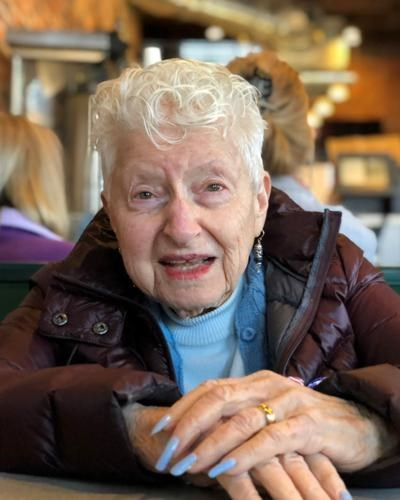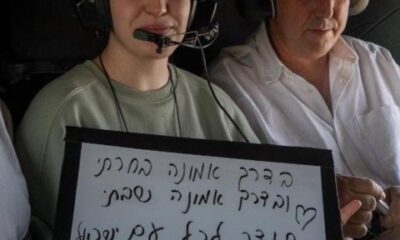
Banner

Siegal family laments Keith’s absence at mom’s funeral
Freed South African-born hostage Aviva Siegel ached at her mother-in-law’s funeral this week, mourning not only the loss of the family matriarch but the prolonged absence of her husband, Keith, in captivity.
Keith, 64, an Israeli-American, remains in Hamas captivity in Gaza more than 425 days after being abducted with his wife from their home during the 7 October terrorist attack on Kfar Aza.
His mother, Gladys Siegel, 97, who had dementia, died peacefully on the weekend without knowing that Keith, her youngest of four, was a hostage.
“The family wanted to shield her from the pain of knowing,” Aviva’s twin sister, Fiona Wax, told the SA Jewish Report.
For more than a year, the Siegel family kept Gladys from the truth, fearing the knowledge of her son’s abduction would shatter her. Now, Aviva and her daughter, Elan Tiv, 33, made the journey from Israel to the funeral, a poignant reminder of the brutal cost of captivity.
Aviva, who was freed from captivity after 51 days as part of a hostage deal, wept for the tragedy of their family’s separation. Her sister said she was consumed by the haunting thought of her husband learning of his mother’s death not from family, but from a Hamas terrorist, somewhere in the oppressive darkness of a tunnel. “It breaks my heart to think of him, alone and frightened, without anyone to console him,” Aviva told her sister.
“The family’s fear is that word will reach Keith that his mother has passed, and there will be no-one there to comfort him,” she told the SA Jewish Report.
Aviva’s presence at the pulpit of Beth El Synagogue in Durham, North Carolina, on Tuesday, 3 December, was quietly powerful, her plain black shirt and silver hostage tag necklace speaking volumes about her pain, resilience, and unwavering dedication to those still in captivity. Her words carried the weight of absence and longing as she shared that her husband would have wanted nothing more than to be there to bid his mother a final farewell.
She shared with mourners how during their time in captivity, her husband had quietly told her that he was thinking of his mother.
“He came up to me and whispered, ‘The first thing that I want to do when I get out of here is to go to my mom to give her a hug,’” she shared. “So Gladys, I’m here telling you that from Keith, because he would have loved being here, and it’s just unfair for him not to be here.”
Keith’s brother, Lee, who is also married to an ex-South African, Sheli Siegel, told mourners, “We’re thankful that our mother didn’t have to suffer the pain and suffering every day that Keith, her youngest child, her baby, has remained a hostage”.
In a heartfelt post, Keith’s daughter, Elan Tiv, shared her anguish, saying, “My grandmother passed away yesterday morning. My father’s mother is gone, and he couldn’t say goodbye to her because he’s been in Hamas captivity for more than a year. Dad won’t be able to stand with us at the cemetery or honour the woman who raised him with love his entire life.”
At the time of publication, it had been 425 days since the start of the war and the horrifying events that tore the Siegel family apart. Keith and Aviva Siegel were abducted at gunpoint from their home in Kfar Aza, a kibbutz near the Gaza border, and driven into Gaza in their own car. During that same attack, Hamas terrorists brutally killed 62 residents of the community and abducted 19 others.
Keith suffered severe injuries during the abduction, including a gunshot wound to his hand and broken ribs. The couple remained together in captivity until November 2023, when Aviva was released during a temporary ceasefire as part of a hostage exchange. A year later, Aviva never imagined she would still be waiting for her husband to return home.
Since her release, she has lived in anguish, becoming a fierce warrior for the hostages’ release.
Elan voiced her fury at the lack of progress in securing another hostage deal. “My father is in the scariest pit in the world, about an hour’s drive from Tel Aviv, suffering from hunger and unimaginable abuse, and they’re just letting him sit there. They’re not bringing him home,” she said.
Elan’s outcry comes amid heightened tensions, with Hamas recently releasing a propaganda video featuring another American-Israeli hostage, Edan Alexander. Meanwhile, the Israel Defense Forces confirmed that American-Israeli hostage Omer Neutra, previously believed alive, had been killed during the 7 October attack.
United States President-elect Donald Trump has vowed “unprecedented firepower” if the hostages remain in captivity when he takes office on 20 January, adding international pressure to an already desperate situation.
Since her release, Aviva has spoken out about the horrors she experienced in captivity. She testified before the Knesset, exposing the sexual violence Hamas inflicted on female hostages. She has also travelled extensively, addressing organisations like the Red Cross and the United Nations in Geneva, and meeting high-profile leaders, including US President Joe Biden and Secretary of State Antony Blinken.
“I told Keith I would stay strong for him and do everything in my power to bring him home,” she said. “I know the conditions they are living under – it’s too terrible. Every day that passes puts them in greater danger.”
Now staying with her daughter, Elan, at Kibbutz Gazit in northern Israel, Aviva has vowed not to return to Kfar Aza.
Gladys Siegel was a pillar of the Jewish community, performing many acts of charity and good deeds as well as being actively involved with Meals on Wheels for more than 50 years. She was the first woman president of both the Conservative Beth El Synagogue and the Jewish Federation of Durham-Chapel Hill, and headed the local chapter of Hadassah, the Jewish women’s organisation. She’s survived by four children, 10 grandchildren, and 13 great-grandchildren.










